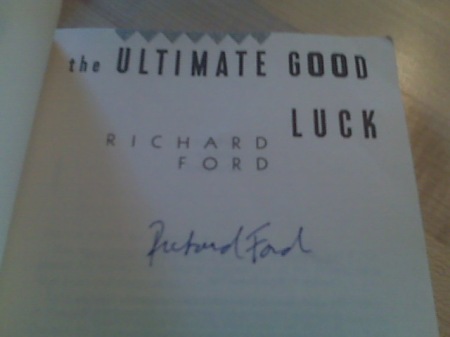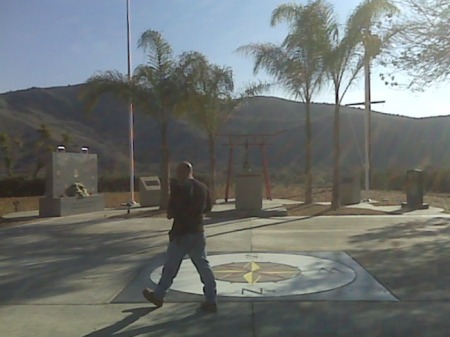Over the weekend, newspapers, wire services, book reviews and top-shelf blogs have all mourned David Foster Wallace, author of the sprawling Infinite Jest, several volumes of short stories, and a manic, unstoppable social critic. They say we lost a genius, a stylist, a grammarian, a prophet.
I say we lost one hell of a journalist.
Of course “journalism” seems too dusty a label for what Foster Wallace did, and out of respect for both the writer and the profession, I’m going allow that he was less of a journalist than an essayist, or a correspondent, a postmodern Sam Johnson. But journalism was exactly what he did, covering drug rehab, cruise ships, the porn industry and John McCain’s 2000 campaign for magazines like Esquire, Harper’s and Rolling Stone. His journalism looked unlike anybody else’s, smirking and recoiling and swooning and holding hands with pages and pages of footnotes, which were in turn footnoted, which were bracketed with interpolations, which were themselves footnoted. If Gonzo ditched the drugs, had a college degree and didn’t suck, it might come close to what DFW did for the form.
In my more manic moments, reading “Consider the Lobster,” I’m tempted to describe his nonfiction as the only way for an American to look at his/her culture and not throw themselves into traffic. There’s a moral rigor in his work, a refusal to flinch or look away from the neon lights and the prostitutes and the televised wars and the made-to-order entertainment that is softened by a dry, disarming self-consciousness and an erudite yet informal style. And there’s the hope, too, that one can stand in the middle of the mess and still find the heart to jest.
And he was unsparing. In “Consider the Lobster,” the title piece of his last book of essays, Foster Wallace explores the moral hazards of a most seemingly benign indulgence: a lobster dinner. What if, he asks, there’s nothing benign about throwing a creature into a pot of boiling water, and cranking up the volume on the tube so you can’t hear the frantic, pleading tapping of its claws against the pot? I came out of the essay feeling like a war criminal. After more than two years, I haven’t eaten a lobster (though probably twenty bushels of crabs).
He covered McCain’s 2000 bid for president in “Up, Simba,” written for Rolling Stone. McCain himself lurks in the background, appearing for moments as an impossibly energetic, extremely affable older dude who dishes out shit good-naturedly to the press corps, including the “Twelve Monkeys,” Foster Wallace’s totemic nickname for the pressed-and-starched correspondents from the national news agencies. Instead of pretending to portray the man, Foster Wallace chronicles life on the two tour busses, “Bullshit 1” and “Bullshit 2” that follow McCain from rally to rally. Eye for detail doesn’t even begin to cover it – Foster Wallace feels humanity like we smell sewage, and he embraces it, throws it onto the page like primal matter where it glows with truth.
I know I’ve fallen into the trap of maudlin and unconditional praise, like all the other mourners – even the icy Michiko Kakutani bowed her head and acknowledged the void in literature that wasn’t there a few days ago. I urge those rushing to pick up a copy of “Infinite Jest” to please, instead, consider the lobster. Foster’s enduring legacy may indeed be in fiction, but for this writer at least, he will be remembered as Yr. Corresp., smirkingly scoring his marks upon the page.


 As Editor of Delmarva Quarterly, no small part of my job is to strike out into the Delmarva peninsula, the soggy little morsel of land that hangs between the Chesapeake and Delaware bays, and find our stories in the wild. For all intents and purposes, I grew up here, on a little spit of sand called Cape Henlopen. I left for boarding school at 17, taking with me an obligatory disdain for crabbing, duck hunting, pickup trucks and the acres upon acres of soy beans and cornstalks that lined the highway. At 23, having settled in for my first Delaware autumn in over six years, I find myself in the awkward position of getting to know my homeland again. Sitting on a deck chair with a gin-and-tonic and a copy of Independence Day in my hands, I think: when did those pines get to be so goddamned huge? I’m a stranger in my own backyard.
As Editor of Delmarva Quarterly, no small part of my job is to strike out into the Delmarva peninsula, the soggy little morsel of land that hangs between the Chesapeake and Delaware bays, and find our stories in the wild. For all intents and purposes, I grew up here, on a little spit of sand called Cape Henlopen. I left for boarding school at 17, taking with me an obligatory disdain for crabbing, duck hunting, pickup trucks and the acres upon acres of soy beans and cornstalks that lined the highway. At 23, having settled in for my first Delaware autumn in over six years, I find myself in the awkward position of getting to know my homeland again. Sitting on a deck chair with a gin-and-tonic and a copy of Independence Day in my hands, I think: when did those pines get to be so goddamned huge? I’m a stranger in my own backyard.







